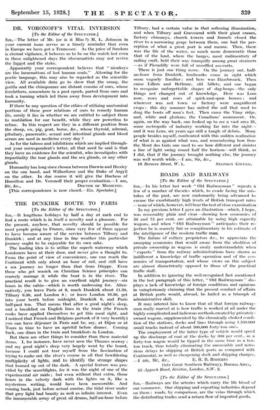THE DUNKIRK ROUTE TO PARIS
[To the Editor of the SPECTATOR.]
SIR,—It lengthens holidays by half a day at each end to fmd a route which is in itself a novelty and a pleasure. For the present, anyhow, that novelty should be possible for most people going, to France, since very few of them appear to have become aware of the service between Tilbury and Dunkirk ; and.at any time in fine weather this particular journey ought to be enjoyable for its own sake.
The leading idea is to utilize the superb waterway which Londoners have at their door, and never give a thought to. From the point of view of convenience, one can reach the Continent with only about an hour of rail, and still have a sea journey no longer than that from Dieppe. Even those who get seasick on Christian Science principles can scarcely manage it while the boat is in the river. The practical result is to give an excellent night journey—six hours in the cabin—which is worth undressing for. Alter- natively, you leave Paris at 8, reach Dunkirk about 11.30, Tilbury 6.30, and London 8 ; or leave London 10.30, get into your berth before midnight, Dunkirk 6, and Paris half-past ten. That means that after a good night's sleep, and a breakfast on English lines in the train (the French cooks have applied themselves to get this meal right, and I noticed that French and Belgians partook of it very heartily) you can have dejeuner in Paris and be, say, at Dijon or at Tours in time to have an aperitif before dinner. Coming back, one dines in the train and breakfasts in London.
But there are other things to consider than these material items. I, for instance, have never seen the Thames seaway ; and my good night's sleep very largely went by the board, because I could not tear myself from the fascination of trying to make out the river's course in all that bewildering multiplicity of lights, and to identify the strange shapes that loomed up out of the dark. A special feature was pro- vided by the searchlights, for it was the night of one of the experimental air raids ; but even without that extra, those' hours in the velvety dark with the lights on it, like a. mysterious writing, would have been memorable. And coming back, just before actual sunrise, the tidal river under that grey light had beauty as well as infinite interest. Even the innumerable array of great oil drums, _half-an-hour before
Tilbury, had a certain value in that softening illumination, and when Tilbury arid Gravesend with their giant cranes, factory chimneys, church. towers and funnels closed the river to a narrowing gorge between them, one had the per- ception of what a great port is and means. Then, there was the life of the water, so much more democratic than that of the land, where the barges, most rudimentary of sailing craft, held their way tranquilly among great steamers —as if Piccadilly were full of unruffled ass-carts.
There is just one thing more. On the journey out, half- an-hour from Dunkirk, landmarks come in sight which seem vaguely familiar ; and here was Hazebrouck. Then came Lillers and Bethune, old billets, and one began to recognize unforgettable shapes of slag-heaps—the only things not changed out of knowledge. Here was .Loos how, rows and rows of spick-and-span houses ; and wherever was not town or factory were magnificent crops : this dry summer has suited the soil that used to drag the boots off men's feet. Then came the Vimy ridge, and, white and glorious, the Canadians' monument. Or, again, on the way back, one looked up to see a vast area lit, some metropolis of industry working far into the night— and it was Lens, six years ago still a tangle of debris. Many people besides myself, confronted with this sudden realization of what is as against what was, and remembering how from the Mont des Gats one used to see how different and sinister a line of light swing round half the horizon:—will think, as I did, that if the journey brought nothing else, the journey was well worth while.—I am, Sir, &c.,






































 Previous page
Previous page